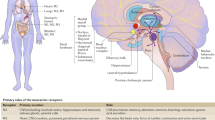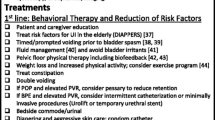Abstract
The blockade of muscarinic receptors in the management of overactive bladder (OAB) symptoms provides beneficial as well as adverse effects. The cognitive changes observed are caused by the drugs’ ability to cross the blood–brain barrier and bind to muscarinic receptors within the central nervous system (CNS). To date, while not specifically testing for CNS side effects, most of the controlled efficacy trials of multiple OAB medications have not shown significant adverse effects on cognitive function. However, elderly individuals, in whom OAB is more prevalent, often are excluded from these studies. The few trials that have performed cognitive testing in healthy elderly people taking antimuscarinics have clearly shown that oxybutynin can adversely affect cognition. Darifenacin, trospium, solifenacin, and tolterodine appear to have little to no risk of causing CNS side effects in this population. However, caution needs to be used in elderly patients with preexisting dementia.
Similar content being viewed by others
References
Papers of particular interest, published recently, have been highlighted as: •Of importance •• Of major importance
Stewart WF, Van Rooyen JB, Cundiff GW, Abrams P, Herzog AR, Corey R, et al. Prevalence and burden of overactive bladder in the United States. World J Urol. 2003;20(6):327–36.
Tubaro A. Defining overactive bladder: epidemiology and burden of disease. Urology. 2004;64(6 Suppl 1):2–6.
Sigala S, Mirabella G, Peroni A, Pezzotti G, Simeone C, Spano P, et al. Differential gene expression of cholinergic muscarinic receptor subtypes in male and female normal human urinary bladder. Urology. 2002;60(4):719–25.
Andersson KE, Yoshida M. Antimuscarinics and the overactive detrusor—which is the main mechanism of action? Eur Urol. 2003;43(1):1–5.
•• Wiedemann A, Schwantes PA. Antimuscarinic drugs for the treatment of overactive bladder: are they really all the same?—a comparative review of data pertaining to pharmacological and physiological aspects. Euro J Ger. 2007; 9 (suppl 1):29–42. This is an excellent review of the mechanisms of action of antimuscarinics at the muscarinic receptors and adverse CNS effects.
Kay GG, Granville LJ. Antimuscarinic agents: implications and concerns in the management of overactive bladder in the elderly. Clin Ther. 2005;27(1):127–38. quiz 139–140.
Feinberg M. The problems of anticholinergic adverse effects in older patients. Drugs Aging. 1993;3(4):335–48.
Mangoni AA, Jackson SH. Age-related changes in pharmacokinetics and pharmacodynamics: basic principles and practical applications. Br J Clin Pharmacol. 2004;57(1):6–14.
•• Abrams P, Andersson KE. Muscarinic receptor antagonists for overactive bladder. BJU Int. 2007; 100(5):987–1006. This is a full review of antimuscarinic drugs with respect to efficacy, tolerability and safety.
Kay GG, Abou-Donia MB, Messer Jr WS, Murphy DG, Tsao JW, Ouslander JG. Antimuscarinic drugs for overactive bladder and their potential effects on cognitive function in older patients. J Am Geriatr Soc. 2005;53(12):2195–201.
•• Wagg A, Verdejo C, Molander U. Review of cognitive impairment with antimuscarinic agents in elderly patients with overactive bladder. Int J Clin Pract. 2010; 64(9):1279–86. This is a review of cognitive side effects of the available antimuscarinics in elderly people.
Abbott NJ, Ronnback L, Hansson E. Astrocyte-endothelial interactions at the blood-brain barrier. Nat Rev Neurosci. 2006;7(1):41–53.
•• Kay GG, Ebinger U. Preserving cognitive function for patients with overactive bladder: evidence for a differential effect with darifenacin. Int J Clin Pract. 2008; 62(11):1792–800. The authors explain pathophysiologic mechanisms of cognitive side effects of antimuscarinics and review available literature for each drug in clinical and animal studies.
•• Chancellor M, Boone T. Anticholinergics for overactive bladder therapy: central nervous system effects. CNS Neuroscience & Therapeutics. 2011; 00: 1–8. This article explains pathophysiologic mechanisms of cognitive side effects of antimuscarinics and reviews the data from various clinical studies on CNS effects of antimuscarinics.
Callegari E, Malhotra B, Bungay PJ, Webster R, Fenner KS, Kempshall S, Laperle JL, Michel MC, Kay GG. A comprehensive nonclinical evaluation of the CNS penetration potential of antimuscarinic agents for the treatment of overactive bladder. Br J Clin Pharmacol. 2011: Accepted Article
Geyer J, Gavrilova O, Petzinger E. The role of p-glycoprotein in limiting brain penetration of the peripherally acting anticholinergic overactive bladder drug trospium chloride. Drug Metab Dispos. 2009;37(7):1371–4.
Tanaka E. In vivo age-related changes in hepatic drug-oxidizing capacity in humans. J Clin Pharm Ther. 1998;23(4):247–55.
Ancelin ML, Artero S, Portet F, Dupuy AM, Touchon J, Ritchie K. Non-degenerative mild cognitive impairment in elderly people and use of anticholinergic drugs: longitudinal cohort study. BMJ. 2006;332(7539):455–9.
Blazer 2nd DG, Federspiel CF, Ray WA, Schaffner W. The risk of anticholinergic toxicity in the elderly: a study of prescribing practices in two populations. J Gerontol. 1983;38(1):31–5.
Mintzer J, Burns A. Anticholinergic side-effects of drugs in elderly people. J R Soc Med. 2000;93(9):457–62.
•• Kessler TM, Bachmann LM, Minder C, Lohrer D, Umbehr M, Schunemann HJ, Kessels AG. Adverse event assessment of antimuscarinics for treating overactive bladder: a network meta-analytic approach. PLoS One. 2011; 6(2):e16718. This is a current meta-analysis of clinical studies specifically focusing on adverse side effects of the available antimuscarinics, showing similar profiles for all except oral oxybutynin at a greater than 10 mg/d dose.
Kay G, Crook T, Rekeda L, Lima R, Ebinger U, Arguinzoniz M, et al. Differential effects of the antimuscarinic agents darifenacin and oxybutynin ER on memory in older subjects. Eur Urol. 2006;50(2):317–26.
Katz IR, Sands LP, Bilker W, DiFilippo S, Boyce A, D’Angelo K. Identification of medications that cause cognitive impairment in older people: the case of oxybutynin chloride. J Am Geriatr Soc. 1998;46(1):8–13.
Gulsun M, Pinar M, Sabanci U. Psychotic disorder induced by oxybutynin: presentation of two cases. Clin Drug Investig. 2006;26(10):603–6.
Pietzko A, Dimpfel W, Schwantes U, Topfmeier P. Influences of trospium chloride and oxybutynin on quantitative EEG in healthy volunteers. Eur J Clin Pharmacol. 1994;47(4):337–43.
Todorova A, Vonderheid-Guth B, Dimpfel W. Effects of tolterodine, trospium chloride, and oxybutynin on the central nervous system. J Clin Pharmacol. 2001;41(6):636–44.
Diefenbach K, Arold G, Wollny A, Schwantes U, Haselmann J, Roots I. Effects on sleep of anticholinergics used for overactive bladder treatment in healthy volunteers aged > or = 50 years. BJU Int. 2005;95(3):346–9.
Staskin DR, MacDiarmid SA. Using anticholinergics to treat overactive bladder: the issue of treatment tolerability. Am J Med. 2006;119(3 Suppl 1):9–15.
Kay GSD, MacDiarmid S, McIIwain M, Dahl N. Are the effects of oxybutynin on cognition dependent upon the route of administration – topical or oral? A double-blind placebo controlled study employing sensitive cognitive and psychomotor testing. Neurourol Urodyn. 2009;28:711–2.
Kay G, Kardiasmenos K, Crook T. Differential effects of the antimuscarinic agents tolterodine tartrate ER and oxybutynin chloride ER on recent memory in older subjects. Neurourol Urodyn. 2006;25:615.
Tsao JW, Heilman KM. Transient memory impairment and hallucinations associated with tolterodine use. N Engl J Med. 2003;349(23):2274–5.
Salvatore S, Serati M, Cardozo L, Uccella S, Bolis P. Cognitive dysfunction with tolterodine use. Am J Obstet Gynecol. 2007;197(2):e8.
Williams SG, Staudenmeier J. Hallucinations with tolterodine. Psychiatr Serv. 2004;55(11):1318–9.
Womack KB, Heilman KM. Tolterodine and memory: dry but forgetful. Arch Neurol. 2003;60(5):771–3.
Chapple CR, Rechberger T, Al-Shukri S, Meffan P, Everaert K, Huang M, et al. Randomized, double-blind placebo- and tolterodine-controlled trial of the once-daily antimuscarinic agent solifenacin in patients with symptomatic overactive bladder. BJU Int. 2004;93(3):303–10.
Wagg A, Wyndaele JJ, Sieber P. Efficacy and tolerability of solifenacin in elderly subjects with overactive bladder syndrome: a pooled analysis. Am J Geriatr Pharmacother. 2006;4(1):14–24.
Wesnes KA EC, Tretter RN, Patel H, Bolodeoku J. Solifenacin is not associated with cognitive impairment or sedation in the elderly: the randomized, double-blind SCOPE study. Br Geriatr Soc (Autumn Meeting). 2008; Birmingham, UK: Poster 68
Foote J, Glavind K, Kralidis G, Wyndaele JJ. Treatment of overactive bladder in the older patient: pooled analysis of three phase III studies of darifenacin, an M3 selective receptor antagonist. Eur Urol. 2005;48(3):471–7.
Chapple C, DuBeau C, Ebinger U, Rekeda L, Viegas A. Darifenacin treatment of patients > or = 65 years with overactive bladder: results of a randomized, controlled, 12-week trial. Curr Med Res Opin. 2007;23(10):2347–58.
Lipton RB, Kolodner K, Wesnes K. Assessment of cognitive function of the elderly population: effects of darifenacin. J Urol. 2005;173(2):493–8.
Kay GG, Wesnes KA. Pharmacodynamic effects of darifenacin, a muscarinic M selective receptor antagonist for the treatment of overactive bladder, in healthy volunteers. BJU Int. 2005;96(7):1055–62.
Michel MC. Fesoterodine: a novel muscarinic receptor antagonist for the treatment of overactive bladder syndrome. Expert Opin Pharmacother. 2008;9(10):1787–96.
Chapple CR, Van Kerrebroeck PE, Junemann KP, Wang JT, Brodsky M. Comparison of fesoterodine and tolterodine in patients with overactive bladder. BJU Int. 2008;102(9):1128–32.
Kraus SR, Ruiz-Cerda JL, Martire D, Wang JT, Wagg AS. Efficacy and tolerability of fesoterodine in older and younger subjects with overactive bladder. Urology. 2010;76(6):1350–7.
• Staskin D, Kay G, Tannenbaum C, Goldman HB, Bhashi K, Ling J, Oefelein MG. Trospium chloride has no effect on memory testing and is assay undetectable in the central nervous system of older patients with overactive bladder. Int J Clin Pract. 2010; 64(9):1294–300. The SMART trial demonstrated the absence of adverse effects on memory testing in older patients as well as the absence of trospium in these patients’ cerebrospinal fluid.
• Sand PK, Johnson Ii TM, Rovner ES, Ellsworth PI, Oefelein MG, Staskin DR. Trospium chloride once-daily extended release is efficacious and tolerated in elderly subjects (aged >/= 75 years) with overactive bladder syndrome. BJU Int. 2010; 107(4):612–20. The authors of this article analyzed pooled data from two phase 3 trials of trospium chloride and demonstrated efficacy and tolerability in elderly patients.
Staskin D, Kay G, Tannenbaum C, Goldman HB, Bhashi K, Ling J, et al. Trospium chloride is undetectable in the older human central nervous system. J Am Geriatr Soc. 2010;58(8):1618–9.
Staskin DR, Harnett MD. Effect of trospium chloride on somnolence and sleepiness in patients with overactive bladder. Curr Urol Rep. 2004;5(6):423–6.
Sand PK, Rovner ES, Watanabe JH, Oefelein MG. Once-daily trospium chloride 60 mg extended release in subjects with overactive bladder syndrome who use multiple concomitant medications: post hoc analysis of pooled data from two randomized, placebo-controlled trials. Drugs Aging. 2011;28(2):151–60.
Siegler EL, Reidenberg M. Treatment of urinary incontinence with anticholinergics in patients taking cholinesterase inhibitors for dementia. Clin Pharmacol Ther. 2004;75(5):484–8.
Edwards KR, O'Connor JT. Risk of delirium with concomitant use of tolterodine and acetyl cholinesterase inhibitors. J Am Geriatr Soc. 2002;50(6):1165–6.
• Sink KM, Thomas J, 3rd, Xu H, Craig B, Kritchevsky S, Sands LP. Dual use of bladder anticholinergics and cholinesterase inhibitors: long-term functional and cognitive outcomes. J Am Geriatr Soc. 2008; 56(5):847–53. The results of this study demonstrated greater functional decline in previously high-functioning nursing home residents taking both an antimuscarinic and cholinesterase inhibitor.
Ney P, Pandita RK, Newgreen DT, Breidenbach A, Stohr T, Andersson KE. Pharmacological characterization of a novel investigational antimuscarinic drug, fesoterodine, in vitro and in vivo. BJU Int. 2008;101:1036–42.
Disclosures
D. Pagoria: none. Dr. R. Corey O’Connor has received honoraria from Astellas Pharma. Dr. Michael Guralnick has received honoraria for speaking engagements for Pfizer and Allergan.
Author information
Authors and Affiliations
Corresponding author
Rights and permissions
About this article
Cite this article
Pagoria, D., O’Connor, R.C. & Guralnick, M.L. Antimuscarinic Drugs: Review of the Cognitive Impact When Used to Treat Overactive Bladder in Elderly Patients. Curr Urol Rep 12, 351–357 (2011). https://doi.org/10.1007/s11934-011-0198-9
Published:
Issue Date:
DOI: https://doi.org/10.1007/s11934-011-0198-9




